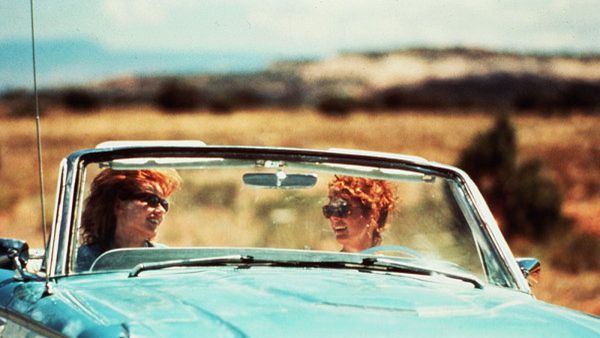Eye For Film >> Movies >> Thelma And Louise (1991) Film Review
Thelma And Louise
Reviewed by: Jeff Robson

When it was announced that Ridley Scott was going to direct ‘a female road trip movie’ more than a few eyebrows were raised. A great director, no doubt, but one whose back catalogue exhibited pretty high testosterone levels. Some people even questioned the idea of doing a ‘buddy film’, another quintessentially American genre, with female leads, a Butch And Sundance for the post-feminist generation. Just before its release in Britain, an impeccably liberal friend of mine said: “but women don’t really have friendships like that, do they?”
Well, Callie Khouri certainly thought they did, and she found herself defending her script and her characters in talk shows on both sides of the Atlantic, manfully (if that’s the right word!) backed by Scott. Thelma And Louise generated a lot of controversy and many people doubted it would do all that well at the box office. Eighteen years, an Oscar (plus six nominations) and a big chunk of change in the black column later, it’s safe to assume that this film’s place in movie history, and popular culture in general, is cemented. It’s inspired a Simpsons episode, innumerable car ads and an online travel club. It did nobody’s career any harm and has appeared on more than one ‘All-Time Favourites’ list. But after all these years, and trying as hard as possible to set all that baggage aside, how does it rate as a film?

Pretty damn high, in my opinion. Not perfect, and not quite Scott’s finest hour (that’s Legend, of course – just kidding!) But a terrific ensemble piece, a not-bad thriller, a sharp and subtle study of unfulfilled lives held together by friendship – and yes, it works as a road movie and a buddy film.
The buddies in question are, of course, Thelma (Davis) and Louise (Sarandon). Both live lives of quiet desperation in an identikit Oklahoma town: Thelma is trapped in a dull marriage to Darryl (McDonald), a man who makes Jim Royle and Alf Garnett look like models of metrosexuality; Louise had a dead-end waitressing job and a commitment-phobic musician boyfriend (Madsen). Just about the best thing in both their lives is their friendship. So when they head off for a fishing trip in the mountains, driving Louise’s Thunderbird convertible, all seems set fair for a few days of unwinding and ‘non-bloke stuff’ chat. But on their first night a chance encounter in a cowboy bar sends everything decidedly pear-shaped.
A drunken redneck won’t take no for an answer, follows Thelma into the parking lot and tries to rape her. Louise pulls a gun to make him stop and he does so, but launches a foul-mouthed tirade against both women. In response Louise shoots him dead.
Thelma is all for going to the police, but Louise is convinced they won’t believe what happened and blame Thelma for ‘leading him on’. She resolves to try to escape to Mexico and, despite her misgivings, Thelma goes with her. Unfortunately, Louise refuses to travel through Texas on account of an unspecified trauma in her past. Thelma reasonably points out that “there ain’t no way to get to Mexico ‘cept through Texas” but her friend remains adamant.
They pursue their circuitous route to the border, but news of the crime has spread. As the hunt intensifies, led by a sympathetic but basically uncomprehending detective (Keitel), they encounter various, and generally unprepossessing, examples of the American Male in all his glory – including a charming young drifter (Pitt), whom Thelma falls for.
It’s these incidental episodes that are the heart of the film, as the power dynamic between the two women shifts this way and that, and they begin to realise how limited their lives have become. The irony, of course, is that it’s taken a traumatic and tragic episode to bring all this to a head, and that there’s no guarantee there’ll be anything better waiting in Mexico – if they even manage to get there...
Even for a road movie, the plot does meander a tad too much. And it’s often been said, in discussions of this film, that if they had thrown themselves on the mercy of the law at the start things would probably have worked out all right. Well, that would have made for a much shorter film, and kind of misses the point. Louise’s fear that a policeman wouldn’t believe their story seems, sadly, all too plausible, and even with a more positive outcome it would have been another example of their lives being defined by their relation to men, and men’s opinion of them.
By opting out of that altogether, they do attain freedom of a kind. Of course, one can also argue that by becoming outlaws on the run, who end up perfectly ready, willing and able to pull a gun on any asshole who gets in their way, they just exchange one male-constructed stereotype for another. But the fact that this film still gets people talking, and arguing, nearly 20 years on, is surely an argument for its quality and relevance.
Khouri’s script is sharp, sassy and believable – the men don’t get much of a look-in but that redresses a certain imbalance in the genre. Scott handles the grand set-pieces and the smaller intimate moments equally well, and renders the southern-fried desertscapes as gorgeous as you’d expect. Once again, the lad from South Shields defied the doubters (and, lest we forget, he did help create another of cinema’s all-time great female characters, Ripley in Alien).
All that wouldn’t count for much if the central performances sucked, of course. But the two leads have rarely been better. Sarandon’s is a perfectly-nuanced study of a blue-collar gal who’s beginning to realise her best years are behind her and isn’t as tough or self-reliant as she’d like to think. Davis takes a role that could have been a cliché and gives Thelma a strength and depth of feeling that’s as much a surprise to her as anyone. Solid supporting turns all down the line, too, including a quintessential star-making turn from Pitt - his snake-hipped, untrustworthy Lothario is the essence of every Hollywood bad boy the good girls can’t help falling for.
If you’ve never seen this film before, you’re in for a treat. If you have, whack it on again to remind yourself how good and challenging mainstream American cinema can sometimes be. If nothing else, you’ll have some prime material for the next mixed gathering down the pub.
Reviewed on: 19 Mar 2009

















